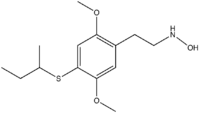HOT-17
HOT-17 (2,5-dimethoxy-4-(β-isobutylthio)-N-hydroxyphenethylamine) is a psychedelic phenethylamine of the 2C family. It was synthesized by Alexander Shulgin and reported in his book PiHKAL.[1]
 | |
| Names | |
|---|---|
| IUPAC name
N-[2-(4-sec-Butylsulfanyl-2,5-dimethoxy-phenyl)-ethyl]-hydroxylamine | |
| Other names
2-[4-(Isobutylthio)-2,5-dimethoxyphenyl]ethanaminol | |
| Identifiers | |
3D model (JSmol) |
|
| ChEMBL | |
| ChemSpider | |
PubChem CID |
|
CompTox Dashboard (EPA) |
|
| |
| |
| Properties | |
| C14H23NO3S | |
| Molar mass | 285.40 g·mol−1 |
Except where otherwise noted, data are given for materials in their standard state (at 25 °C [77 °F], 100 kPa). | |
| Infobox references | |
Chemistry
HOT-17's full chemical name is 2-[4-(2-isobutylthio)-2,5-dimethoxyphenyl-N-hydroxyethanamine. It has structural properties similar to 2C-T-17 and to other drugs in the HOT- series, with the most closely related compounds being HOT-2 and HOT-7.
General information
The dosage range of HOT-17 is typically 70-120 mg and its duration is approximately 12–18 hours according to Shulgin.[1] HOT-17 produces time distortion and general psychedelia. It also has little to no body load.
See also
References
This article is issued from Wikipedia. The text is licensed under Creative Commons - Attribution - Sharealike. Additional terms may apply for the media files.